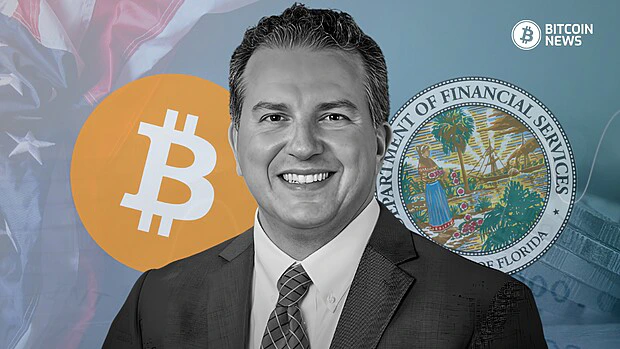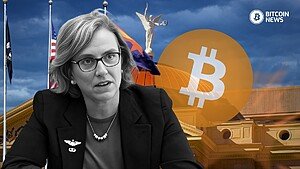In a bold move toward financial innovation, Florida’s Chief Financial Officer (CFO) Jimmy Patronis has called for Bitcoin to be considered as an investment for the state’s retirement funds.
This recommendation, outlined in a letter addressed to the State Board of Administration (SBA), reflects growing interest from several U.S. states in diversifying public pension funds with bitcoin.
Patronis’s proposal aligns closely with former President Donald Trump’s vision of a “national stockpile” of bitcoin, which was first revealed during Trump’s appearance at the Bitcoin 2024 convention.
Related: Trump Addressed Bitcoin Enthusiasts in Nashville: A Summary
Patronis’s October 29 letter was directed to SBA Executive Director Chris Spencer, asking for a report that would explore “the feasibility, risk, and potential benefits of directing a portion of state retirement system monies into digital asset classes.”
The letter emphasizes that bitcoin, often described as “digital gold,” could add both stability and diversification to Florida’s retirement funds, which currently include investments totaling over $205 billion as of September 30.
“Bitcoin is often called ‘digital gold,’ and it could help diversify the state’s portfolio and provide a secure hedge against the volatility of other major asset classes,” Patronis wrote in the letter, highlighting the potential of digital assets to support the state’s investment goals.
Patronis proposed using the Florida Growth Fund to pilot a “Digital Currency Investment Program” and noted that other states, including Wisconsin and Michigan, have already ventured into bitcoin for their pension funds.
Wisconsin, for instance, has allocated $164 million to Bitcoin ETFs through its State Investment Board, while Michigan has a smaller stake in Bitcoin ETFs. Arizona has also advanced similar efforts to encourage pension fund managers to consider bitcoin in their portfolios.
Related: Bitcoin’s Inclusion in Pension Funds an Inevitability | Saylor
Patronis added:
“When managing state pensions for firefighters, teachers, and police officers, it’s also essential to prioritize the bottom line and ensure the best return on investment for Floridians. This is where the potential of investing in a cryptocurrency, like Bitcoin, becomes particularly compelling.”
Patronis’s proposal echoes Trump’s remarks on the importance of Bitcoin to national interests, given the rapid growth of blockchain technology and the global competition around digital currency.
During the Bitcoin 2024 convention, Trump suggested creating a federal “stockpile” of bitcoin using the digital assets seized during law enforcement actions.
The former president argued that such a reserve could not only serve as a national hedge against inflation but also help position the United States as a world leader in bitcoin adoption.
According to Patronis, Trump’s approach aligns with Florida’s innovation-driven economy.
“I believe this forethought and innovative thinking from a successful businessman like President Trump must not be taken for granted,” Patronis wrote, underscoring the significance of such a vision for the state.
Trump’s emphasis on a “stockpile” is partially motivated by geopolitical factors. The rapid adoption of blockchain and bitcoin technology by global players, including China and Russia, has raised concerns in Washington.
Trump’s idea includes establishing a “crypto presidential advisory council” and expanding national holdings of seized bitcoin, which he views as strategic assets. The move would make the U.S. a bitcoin leader while countering influence from foreign competitors. Trump had stated:
“It will be the policy of my administration…to keep 100% of all the Bitcoin the US government currently holds or acquires into the future. This will serve in effect as the core of the strategic national bitcoin stockpile…I will be the pro-innovation and pro-Bitcoin candidate that America needs and that our citizens deserve.”
The Florida government’s interest in Bitcoin comes as a response to concerns over Central Bank Digital Currencies (CBDCs).
Earlier this year, Governor Ron DeSantis signed legislation aimed at blocking CBDCs, which he described as tools of government overreach that could limit individual financial freedoms.
Patronis praised this legislation, calling it a stand against “woke corporate monitoring” and international control over personal finances. As Patronis emphasized in his letter, Bitcoin represents a decentralized alternative to these centralized currencies.
“Crypto is the antithesis of a central currency,” Patronis wrote, highlighting its decentralized nature as an attractive feature for Floridians.
Patronis’s proposal is intended to align Florida with other U.S. states and to position it as a leader in digital assets.
With a AAA bond rating and a strong economic standing, Patronis believes that Florida has the fiscal strength and stability to support innovative investments, like Bitcoin.
“If Florida were its own sovereign nation, it would be the 16th largest economy globally,” he noted, citing the state’s reputation as a national leader in economic development.
Patronis’s letter specifically mentions a proposed “Digital Currency Investment Pilot Program” that would utilize the Florida Growth Fund to assess Bitcoin’s potential within the growth-focused portfolio.
As part of this initiative, Patronis is requesting a report on the benefits and risks of adding bitcoin to the state’s investment mix, with findings expected by March 2025.
If Florida were to approve bitcoin for its retirement funds, it would be joining a growing number of states testing the waters of bitcoin investment.
In addition to Wisconsin and Michigan, which have incorporated Bitcoin ETFs into their retirement systems, states like Wyoming and Nebraska have also adopted digital-asset-friendly legislation, including frameworks for chartering digital currency banks and other blockchain-related businesses.
These developments reflect a broader trend of U.S. states exploring digital assets as part of their financial strategy.
While bitcoin’s potential as a retirement investment remains debated, the general trend toward bitcoin in public funds highlights the evolving role of digital assets in modern finance.
Advocates argue that Bitcoin’s unique properties as a decentralized, non-inflationary asset could make it an effective hedge, while critics warn of its price volatility and regulatory challenges.










